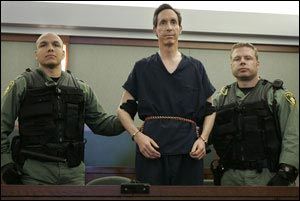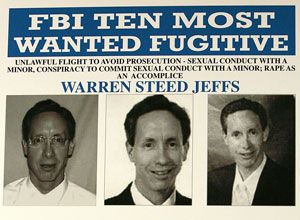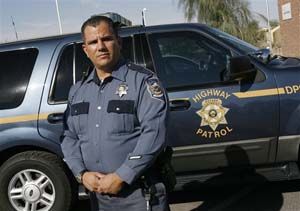By Lt. Jim Glennon, Lombard, IL (ret.)
Earlier this week, Nevada Highway Patrolman Eddie Dutchover made a traffic stop on a car with a paper tag instead of a license plate. As he spoke to the driver, the patrolman noticed the male in the back seat was exhibiting what a trained, observant cop would recognize as suspicious body language.
 |
Warren Jeffs in court. (AP Photo/Laura Rauch) |
“I noticed Warren was extremely nervous. He was sitting in that right side back seat and wouldn’t make eye contact with me,” Dutchover said. “But his carotid artery was pumping.”
The Patrolman began routine questioning of the occupants and noticed that aspects of their stories “didn’t make any sense” to him. In addition to those clues, the suspect, Polygamist Warren Steed Jeffs, began eating a salad during the encounter.
As we talk about in the Calibre Press Street Survival Seminars, learning to read the scene and mastering communication skills is the key to success while engaged as law enforcement professionals. What Patrolman Dutchover did in this case was recognize--and follow through on--a curious combination of red flag body language and verbal inconsistencies.
Let’s briefly look at the clues this fugitive “gave” to the Patrolman.
1. Lack of eye contact and beginning to eat a salad.
 |
An FBI wanted poster is shown Aug. 29, 2006, during a news conference to announce the arrest of fugitive Warren Steed Jeffs. (AP Photo/Matt York) |
The interesting thing about being dressed in a police uniform is that no matter how old you are, how much experience you have, or what your rank, if you are out in public, everybody looks at you. In this case why would the back seat passenger not look at the officer and in fact avoid eye contact?
There are some possible explanations, but in the case of someone who is guilty of a crime, the key reason would be because he is trying to look unconcerned. Unconsciously he believes that an apparent lack of interest will demonstrate to the officer that he has nothing to hide.
In reality, nothing could be further from the truth.
People with nothing to hide are extremely interested in what the police are doing. Experienced officers know that if anything, the uninvolved often get themselves overly involved.
In addition to avoiding eye contact, Jeffs decided that during a traffic stop would be a good time to start eating a salad. Again what he is trying to tell the officer is that he is totally relaxed and unconcerned.
What he did however, was to tell this experienced officer the exact opposite.
 |
Nevada State Trooper Eddie Dutchover after bringing in one of the FBI’s most wanted. (AP Photo/Isaac Brekken) |
2. A noticeably pumping carotid artery.
This is where Patrolman Dutchover sets himself apart from the average street cop. Without the benefit of interviewing the patrolman, I would imagine that the lack of eye contact initially drew his attention to Jeffs. Then, while evaluating the fugitive, he noticed the artery popping noticeably.
What makes the artery pop? The heart pumping hard and fast.
Why would a “backseat” passenger have a heart pumping hard and fast?
He’s worried about something.
Dutchover, recognizing this, began to focus his questions on the wanted man. What a great job!
Besides the body language aspect of this incident, realize this:
This arrest was made by a street cop. A street cop doing a routine, but self-initiated task.
The whole law enforcement world was looking for Jeffs. He was on the news every night. The FBI put him on the most wanted list three months ago. And he was caught because he decided to eat a salad.
The point I am trying to make is the same point Charlie Hanger made in 1995 with this quote; “Another trooper once told me that if you take care of the small stuff, the big things will come to you.” My favorite quote by a cop in my 26 years of law enforcement, because it is so true.
Do your job and you will catch the bad guys, and at times they may be pretty significant bad guys.
Who is Charlie Hanger, by the way? Well at the time of the quote he was an Oklahoma Highway Patrol Trooper who had just made a traffic stop on a car with a missing rear license plate. He noticed nervous behavior by the driver, discovered a gun, and wound up arresting Timothy McVeigh, one of the worst mass murderers in United States history.
A cop doing a routine job but possessing the skills necessary to do it effectively and safely.
It happened again. A fugitive on the FBI’s most wanted list picked up by a street cop doing routine police work.

